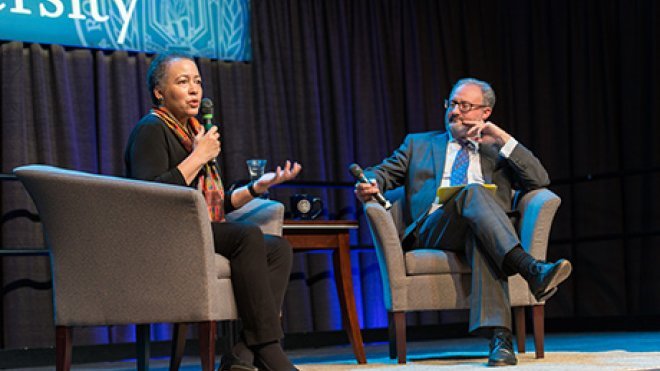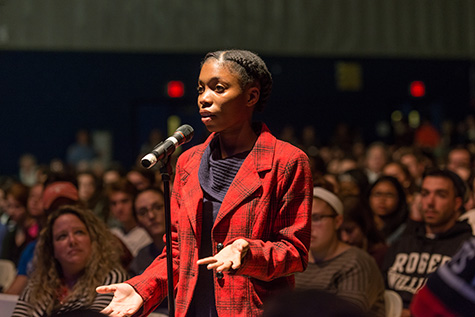Moving Beyond Discomfort: Race Relations Expert Discusses How to Talk About Race
Beverly Daniel Tatum shares strategies on building diversity and inclusion in RWU’s “Talking about Race, Gender and Power” series

BRISTOL, R.I. – Author Beverly Daniel Tatum told the more than 1,000 people packed into the Roger Williams University Field House Wednesday evening to imagine there was a photographer on the stage, taking a shot of the crowd.
If everyone in the audience were given a copy of that photo, what’s the first thing each person would do? Why, they’d look for themselves in the picture, of course, she said.
So, Tatum said, “Think about our campus as like a big photograph. People are stepping into the photo – they are stepping into an environment, looking for themselves in it.” In other words, they’re looking for cues to indicate whether this is a community where they’ll feel they belong, she said.
“So the first thing I like to say to administrators and others who are thinking about these issues is to get in the habit of asking: Who’s missing from the picture?” Tatum said. “If you get in that habit, we are much more likely to create an environment where people feel included than left out.”
Tatum, former president of Spelman College, just released the 20th anniversary edition of her landmark book, “ ‘Why Are All the Black Kids Sitting Together in the Cafeteria?’ And Other Conversations About Race.”

On Wednesday evening, she spoke to a full house as part of RWU’s yearlong series, “Talking About Race, Gender and Power” and the President’s Distinguished Speakers Series. Her book is the RWU Common Reading selection for the 2017-18 academic year, so all first-year students and many others in the campus community are exploring her book in classroom discussions, campus lectures and more.
Provost Andrew Workman led the conversation with Tatum, saying there has been “significant frustration” among students over “campus climate issues” involving race, gender and other differences.
“Over the last few years, the college has put a great deal of emphasis on educating the campus community on differences,” Workman said. “But I think that everyone would agree that we have a long way to go in building a truly inclusive campus.” So he asked what strategies other predominantly white campuses have used to address that issue.
Tatum replied, “There are a lot of colleges and universities that are also struggling. So you are not alone in that.”
As strategies to address these topics, she likes to emphasize the ABCs: “Affirming identity,” “Building community” and “Cultivating leadership.”
“Everyone wants to see themselves reflected in the environment in positive ways – reflected in the curriculum, reflected in the faculty and staff,” she said.

At another point, Tatum asked audience members about their earliest memories involving race. Many indicated they had memories going back as young as age 4 or 5, and many of those memories involved uncomfortable feelings of fear or anger, sadness or embarrassment. At the time, few of those people talked with adults about those feelings.
“We learn early you are not supposed to talk about it,” Tatum said. “And if you have had that experience at (age) 4 or 5 or 6 or 7 and fast-forward now to 17 or 20 or 63 – whatever that age might be – you have had a lot of experience in not having that conversation. For some people, it feels like a taboo – like breaking a rule of some kind – to be asked to engage in these conversations.”
While discussing race can feel risky, Tatum said, “In fact, this is the kind of environment where we should be able to risk some discomfort – to recognize that we are all learning how to do this and we will sometimes make mistakes, need correction, need feedback. But risking that discomfort will help us develop the skills we need to be able to move forward together.”